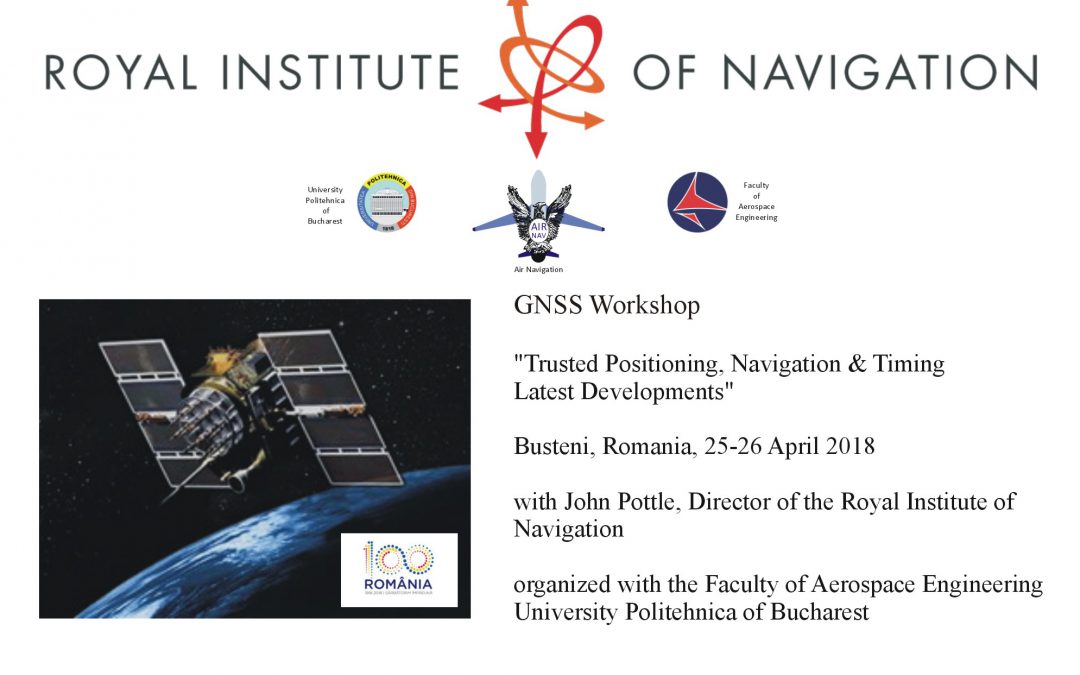The Royal Institute of Navigation of London, with the Faculty of Aerospace Engineering, University Politehnica of Bucharest organize the workshop “Trusted Positioning, Navigation & Timing Latest Developments” on 25 & 26 April 2018. The keynote speaker is John Pottle, Director of the Royal Institute of Navigation. The event will gather the GNSS experts in Romania.
More information <here>
It is the first RIN event in Romania.
The venue is Hotel Alexandros in Bușteni. The event will start on 25 April, 5:30 pm with the presentation of John Pottle, Director of RIN, and will continue the next day from 12 pm with a round table discussion.
The subject of this seminar is the Global Navigation Satellite Systems, and main topics will be:
- Do we need more Satellites?
- How can we design-in trust?
- Will driverless cars use GPS and Galileo?
- Human factors in navigation systems
The invitation is opened to the students of the Faculty of Aerospace Engineering who are interested in the subject. Each student may submit using the regsitration form one, two or three questions to the GNSS experts. The most interesting and relevant questions will be rewarded with the sponsorship of the student to participate to the event (full board accommodation at Hotel Alexandros). The questions will be addressed at the round table. The organizers will sponsor up to 20 students by this method, but other studentd may also participate.
Registration form for the students of the Faculty of Aerospace Engineering:
https://goo.gl/forms/ VnK8eSXHJOcObPGm1
The deadline to submit this registration form with the questions is Friday, 20 April.
Air Navigation Convention 2018
Air Navigation Convention 15th -16th of March 2018 Reaching its 9th edition, the Air Navigation Convention is an important event organized by students of the Air Navigation Department of the Faculty of Aerospace Engineering. Everything starts from the desire to...
E-SGAC Bucharest 2018
Photo: www.esa.int Prof. Dr. Kai-Uwe Schrogl, Chief Strategy Officer at the European Space Agency (ESA) addressed the young community of the space generation at the 3-rd European Space Generation Workshop (SGAC), which took place in Bucharest, on 9-10 March...
Private Pilot Licence SSAvC Scholarships
Courtesy of Eng. George Barbu, CEO of the Aviation Academy and Alumnus of the Faculty of Aerospace Engineering, we announce this opportunity: On the occasion of the Great Union Centenary, as a sign of gratitude for the values that the Faculty of Aerospace...
Faculty Story
The story of the Faculty of Aerospace Engineering is mainly the story of its students. Daniela Andrioaie is a 3rd Year student of the Faculty of Aerospace Engineering, Aeronautical Constructions program of studies. She came to this faculty from a pretty long distance,...
Openings at Alten
The French company Alten located in Toulouse advertizes the following openings which match the profile of our graduates: - System Design - Electrical installation - Project management Contact data of Mr. Vincent Castanet, business...
Correct Rules Enforcing Re Evaluations and Resits
Note as of 14 May 2019: FAE-1 and FAE-2 rules have been repealed by Faculty Council Decision of 14 May 2019. Thus, all references to these rules below shall be ignored. The remaining recommendation will be maintained. Faculty Executive Board of FAE in the 24 January...
Job Opening at Bretigny
By courtesy of our Alumnus, Eng. Răzvan Mărgăuan, we invite our students, master students and fresh graduates to consider this job opening at the EUROCONTROL Experimental Center (near Paris) in domain of ATM Simulation and Modelling (including BADA). <Job...
Invitație în Asociația Alumni Politehnica Aerospace Engineering
We invite all our graduates, engineering, bachelor, master, advanced and doctoral studies to register in our Alumni Politehnica Aerospace Engineering Association. The Faculty of Aerospace Engineering gave the Romanian and World aviation an prestigious gallery...
114 Years of Aviation
Today in 1903: Wilbur and Orville Wright made four brief flights at Kitty Hawk, North Carolina, with their first powered aircraft. This photo was taken as Orville piloted the Wright Flyer on its first flight of the day, which lasted 12 seconds and covered 36 m (120...
MS Regele Mihai
The academic community of the Faculty of Aerospace Engineering is in pain and deep sorrow for the loss of HM King Michael I of Romania (1921-2017). The King was a passionate of technology, especially of aviation. Some pictures that we found illustrate this...


0 Comments